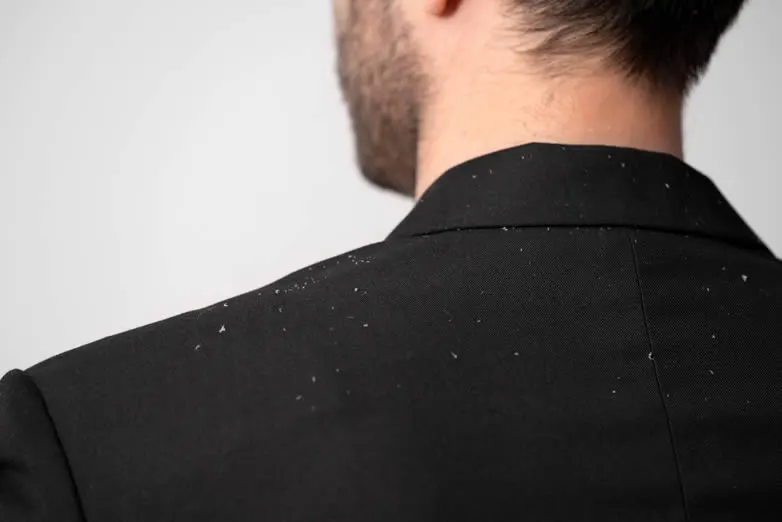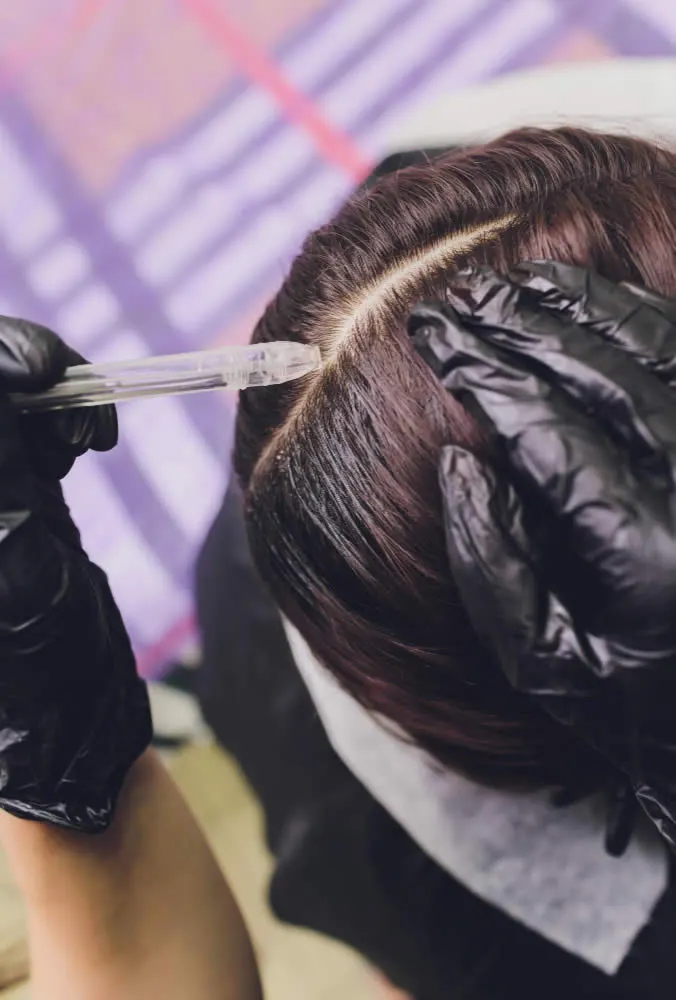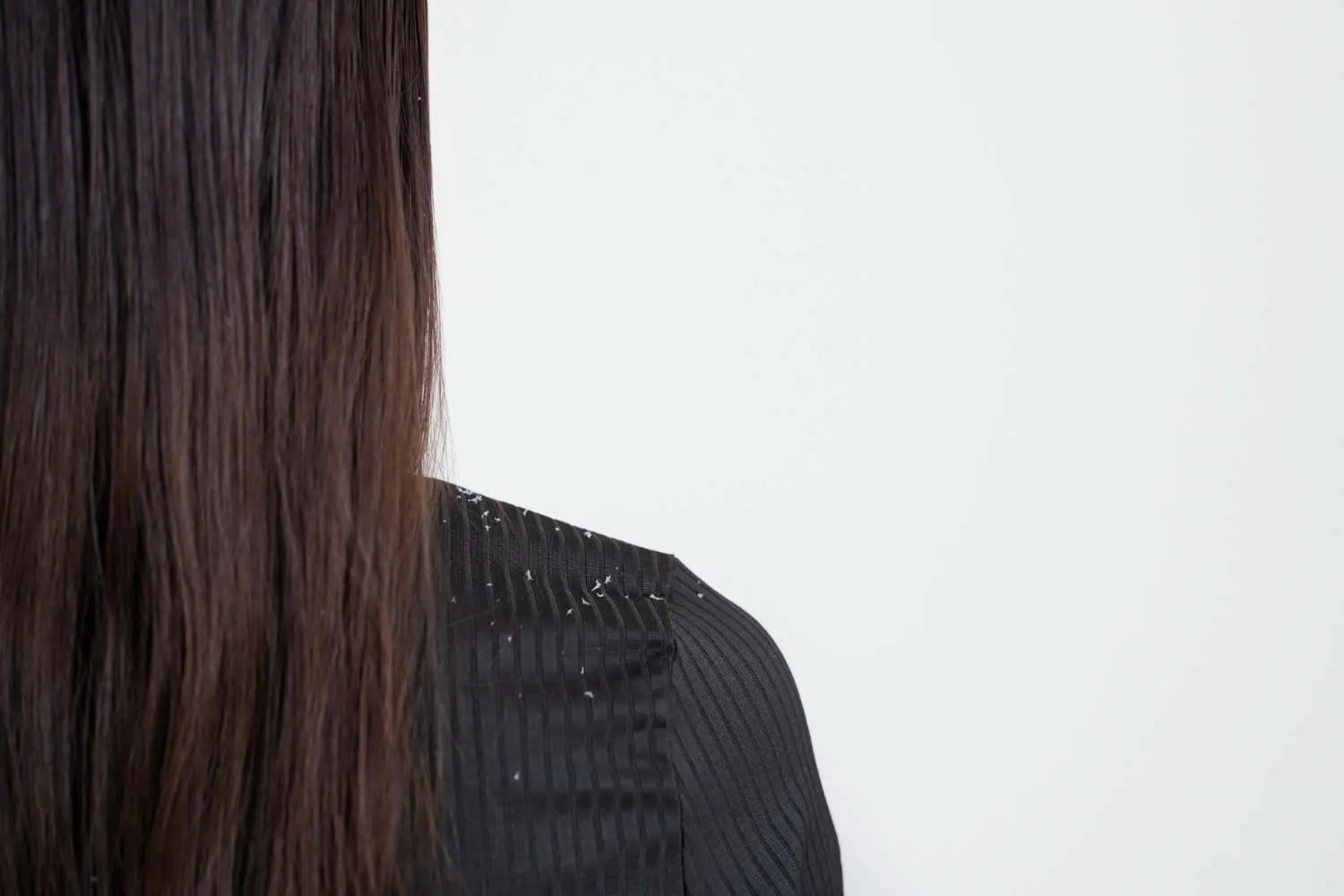What is Dandruff?
Dandruff is a common condition that causes the skin on the scalp to flake and itch. It can be caused by various factors, such as irritated, oily or dry skin, a yeastlike fungus, sensitivity to hair products, or other skin conditions.

What are the signs and symptoms of Dandruff?
Some signs and symptoms of dandruff are:
- Skin flakes on your scalp, hair, eyebrows, beard or mustache, and shoulders. The flakes can be white, grey, or yellow in color and vary in size.
- Itchy scalp that may be dry, red, or scaly.
- Scaly, crusty, or red patches on the scalp, face, or other parts of the body. These patches may be caused by seborrheic dermatitis, a skin condition that is related to dandruff.
- Sensitivity or irritation to hair care products, such as shampoos, conditioners, gels, or sprays. This may cause contact dermatitis, a type of allergic reaction that can worsen dandruff.
- Hair loss or thinning in some cases, especially if the dandruff is caused by a fungal infection called tinea capitis or ringworm.
What are the causes of Dandruff?
- Irritated, oily skin. This condition, also known as seborrheic dermatitis, can affect the scalp and other areas of the body. It causes redness, inflammation, and flaking of the skin.
- Dry skin. This can make the scalp more prone to peeling and itching, especially in cold and dry weather.
- A yeastlike fungus (malassezia). This fungus normally lives on the scalp of most adults, but sometimes it can grow out of control and feed on the oils on the scalp. This can irritate the skin and cause more skin cells to grow and shed.
- Sensitivity to hair care products (contact dermatitis). Some people may have an allergic reaction to certain ingredients in shampoos, conditioners, gels, or sprays. This can cause redness, itching, and scaling of the scalp.
- Other skin conditions, such as psoriasis and eczema. These can cause inflammation, dryness, and flaking of the skin on the scalp and other parts of the body.
What treatments are available at the dermatologist for Dandruff?
Some treatments that are available at the dermatologist for dandruff are:
- Topical steroids or steroid shampoos. These can help reduce inflammation and itching caused by dandruff.
- Prescription-strength shampoos. These may contain stronger concentrations of active ingredients such as zinc pyrithione, selenium sulfide, coal tar, or ketoconazole. These can help loosen the flakes, reduce inflammation, or fight the fungus that causes dandruff.
- Other medications. These may include antifungal pills, antibiotics, or immunosuppressants. These can help treat underlying conditions that may be causing or worsening dandruff, such as seborrheic dermatitis, psoriasis, fungal infections, or eczema.

How to Deal with Dandruff in the Winter
- Use a dandruff shampoo that contains ingredients such as zinc pyrithione, selenium sulfide, coal tar, or ketoconazole. These can help loosen the flakes, reduce inflammation, or fight the fungus that causes dandruff.
- Apply coconut oil or aloe vera gel to your scalp before washing your hair. These natural remedies may help moisturize your scalp, prevent dryness, and reduce itching.
- Avoid using harsh or irritating hair products, such as shampoos, conditioners, gels, or sprays that contain alcohol, fragrances, or sulfates.
How Dandruff Affects Your Scalp Health and Hair Growth
Some of the effects of dandruff are:
- Inflammation and irritation. Dandruff can cause redness, swelling, and itching of the scalp, which can damage the skin barrier and make it more prone to infections and inflammation. This can also affect the hair follicles and interfere with their normal function and growth cycle.
- Dryness and brittleness. Dandruff can make the scalp and hair dry and dull, especially in cold and dry weather. This can lead to hair breakage, split ends, and reduced shine and elasticity. Dryness can also worsen the flaking and itching of the scalp.
- Hair loss or thinning. Dandruff can cause temporary or permanent hair loss or thinning in some cases, depending on the severity and cause of the condition. For example, dandruff caused by a fungal infection called tinea capitis or ringworm can lead to scarring alopecia, which is irreversible hair loss due to scar tissue formation on the scalp.
- Low self-esteem and confidence. Dandruff can affect your appearance and social interactions, as it can be visible on your hair, shoulders, and clothing. It can also make you feel embarrassed, self-conscious, or anxious about your scalp condition.
FAQ About Dandruff
Is dandruff contagious?
No, dandruff is not contagious. You cannot catch it from someone else or spread it to others. However, some types of fungal infections that cause dandruff may be contagious. For example, tinea capitis or ringworm is a fungal infection that can cause scaly patches and hair loss on the scalp. It can be transmitted by direct contact with infected people or animals, or by sharing combs, brushes, hats, or towels.
Can children and babies get dandruff?
Yes, children and babies can get dandruff too. In infants, dandruff is often called cradle cap. It is a common condition that causes scaly, crusty patches on the scalp. It usually clears up on its own within a few months.
Can diet affect dandruff?
There is no clear evidence that diet directly causes or cures dandruff. However, some studies suggest that certain nutrients may help improve your scalp health and reduce inflammation
Can I dye my hair if I have dandruff?
Yes, you can dye your hair if you have dandruff. However, you should be careful about the type of dye you use and how often you use it. Some hair dyes contain harsh chemicals that can irritate your scalp and worsen your dandruff. You should avoid using permanent or semi-permanent dyes that contain ammonia or peroxide. Instead, you can use temporary or natural dyes that are gentler on your scalp and hair. You should also avoid dyeing your hair too frequently, as this can dry out your scalp and hair.
Is there a dermatologist near me in Amarillo that offers treatment for Dandruff?
Yes. At our Amarillo dermatology office we offers treatment for Dandruff to patients from Amarillo and the surrounding area. Contact our office today to schedule an appointment.

